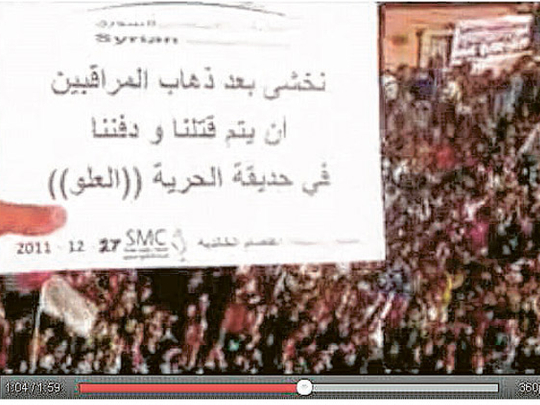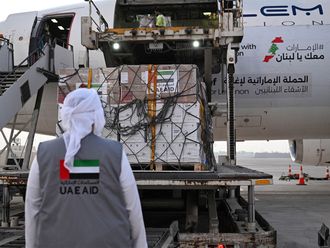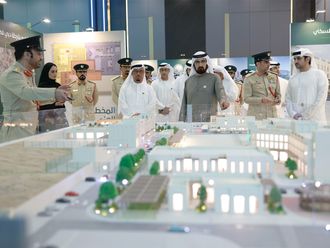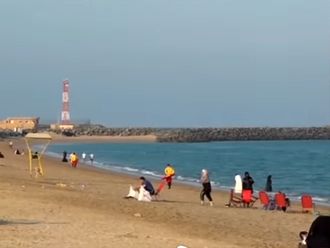
Abu Dhabi: Ahmad Bin Helli, deputy secretary-general of the Arab League, confirmed that the League's mission to Syria will pay field visits to "hot areas" such as Homs, investigate, and write objective reports.
In an interview with Gulf News yesterday, Bin Helli said: "We should not anticipate things since the mission has just started. The 60-member team is the first batch to be sent to Syria to probe the incidents. It will be followed by other delegations."
He dismissed the comments by Egyptian observer Mustashar Mahjoub of widespread killings, pointing out that the only person authorised to give statements on the situation is General Mohammad Ahmad Mustafa Al Dabi, head of the Arab League Mission to Syria.
One spokesperson
"We dismiss any report about this matter and this person does not work for the Arab League at all. The only person who is in charge of giving statements to the press is Al Dabi," Benhelli emphasised.
"The person who gave statements to some satellite channels about conditions in Homs is not a member of the mission," the official said.
"We hope that the mission will be completed within a month and things will be solved in a peaceful manner for the sake of the Syrian people," he said.
With regard to the monitoring team sent to Syria, Benhelli said that it includes military, legal and civilian experts from several Arab countries.
Before his departure for Syria, Al Dabi had told the press that his mission "would go on without any hindrances and impediments". Al Dabi also said that the first group of observers that arrived in Damascus on Monday would head to Homs, Idlib, Hama and other cities.
"The delegation of Arab observers will begin deployment today in different parts of Syria, particularly Homs, Idlib, Hama, Damascus and Deraa," he said.
Before heading to Syria, the mission members held talks with the League Secretary General Nabeel Al Arabi, who told reporters that the team would start its work "immediately on Tuesday".
Close co-operation
Al Dabi said: "We are now in Syria and our mission has started since we arrived in Damascus.
"We had all the procedures and preparations and there is close co-operation with Syrians," he said, adding that the Syrian authorities would provide transportation for the mission members.
Al Dabi also said the second batch of the Arab League Mission which is expected to go to Syria in the coming days would be deployed in Qamishli, Deir Al Zour, and the Syrian Coast.
"Our Syrian brothers are co-operating very well and without any restrictions so far," Al Dabi commented.
He warned those watching the mission not to jump to conclusions about the results. "Give us some time, we just got here," Al Dabi stressed.
According to the Jordanian Ministry of Foreign Affairs, the mission members are civilian and military experts from Jordan, Tunisia, Algeria, Sudan, Iraq, Oman, Egypt, Morocco, Mauritania and Djibouti as well as activists and other Arabs of various nationalities.
They will be working under the umbrella of the Arab Organisation for Human Rights, the Arab Human Rights Committee, the Arab Commission for Human Rights and the Relief Committee of the Union of Arab Doctors.
Abdul Latif Zayani, secretary general of the Gulf Cooperation Council (GCC), told the press earlier that he had informed Al Arabi of the GCC's decision to send 60-100 observers from the region to Syria.
Meanwhile, Syrian sources confirmed that a 60-member delegation comprising ambassadors, officers and experts had arrived.
‘Element of surprise'
They added that the mission includes seven Algerians, seven Moroccans, four Tunisians, 10 Egyptians, two Sudanese, seven Mauritanians, three Saudis, six Iraqis, a Yemeni, a Jordanian, an Emirati and one member from Djibouti.
"Among the names are Jalal Sunousi, a Tunisian minister, brigadier Abdul Latif Jabali of Tunisia, consultant Mohammad Bin Hussain Bin Yousuf of Tunis, colonel Bushaib Farjiyah of Morocco, lieutenant colonel Khalid Bin Rubaian Al Rubaian of Saudi Arabia," according to the Syrian Ministry of Foreign Affairs and Expatriates.
Arab League sources said the mission to Homs aims to assess whether the Syrian army has withdrawn tanks and troops from the city.
Objective
"The mission's objective is to confirm that the Syrian government is executing the Arab League initiative by withdrawing the military from cities, releasing prisoners, and allowing the Arab and international media to visit," monitor Mohammad Salem Al Kaabi from the UAE told Reuters.
Al Kaabi added: "The element of surprise will be present. We will inform the Syrian side of the areas we will visit on the same day so that there will be no room to change realities on the ground by either side."
"After the Syrian government signed the protocol, it is now bound by several points such as providing security for the observers, allowing them to freely roam the streets, visit prisons, and to meet with the opposition," Al Kaaby said.
Russia is ready to send observers to Syria, Mikhail Bogdanov, Deputy Foreign Minister, said earlier this month.
"If we get such a request from the Syrian authorities, opposition or from the League of Arab States, we are ready to join in," Bogdanov told Itar-Tass on December 5.












